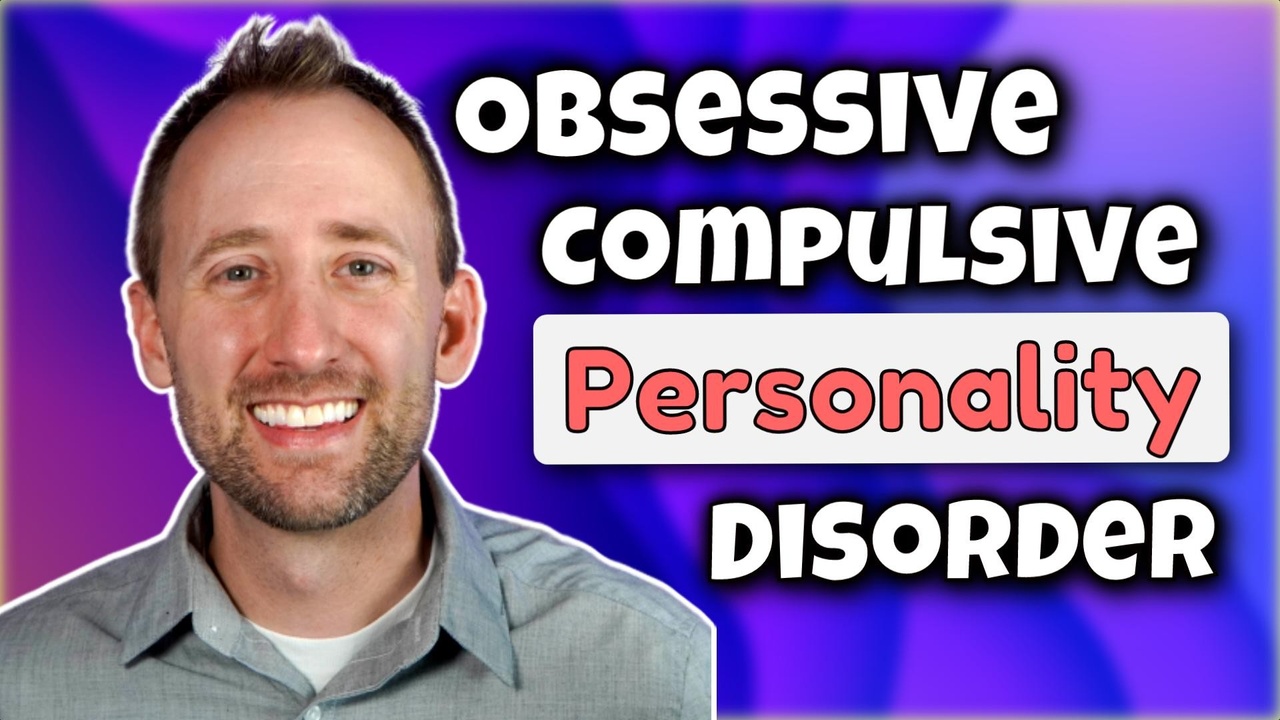Obsessive Compulsive Personality Disorder Symptoms
Feb 14, 2022
What is obsessive compulsive personality disorder
Someone with Obsessive-compulsive personality disorder (OCPD) is defined by strict orderliness, control, and perfectionism. But wait! Isn’t that OCD?
In this video we're going to go through the 4 main characteristics of OCPD and how it’s different than OCD.
Someone with OCPD will likely try to stay in charge of the smallest details of their life. Even if it closes them off to new experiences. Unlike OCD, OCPD is a personality disorder. Which means, it involves traits that are in some way problematic, out of the ordinary, with long held beliefs about something. Often, these individuals may find it difficult to relate to others due to their devotion to the rigid rules or control they have. It’s almost as if the rule that is created is FACT and is CORRECT and there is no other way. It makes perfect sense to the individual, who can get frustrated when others do not understand this factual rule they’ve created. It seems so obvious “that this is the way it’s supposed to be and how do you not understand it.”
Here are 4 ways you can tell if you have OCPD:
#1 – Your rigid adherence to rules and regulations. You may be inflexible. It is the way it’s supposed to be. You may be creating order, lists and tasks to help you with these rules. This may be excessive to create and pay attention to the minor details. Even emotions can have regulations on them. The way you act may need to be in a certain way. Facial expressions or words that come out. Individuals can find themselves devoted to work and tasks at the expensive of family or friends.
#2 – An overwhelming need for order - This excessive devotion often impairs social and family activities. The individual may find it difficult to assign a task to someone else due to it needing to be EXACT. You may be unwilling to change or be flexible with what you think is the right way of doing things. The need for perfection is at the smallest detail. Relationships can be strained due to the desire to have things be a certain way. The lack of flexibility is the key here. The individual may believe that whatever thought or what order is, is exactly the way and no other.
#3 – Unwillingness to yield or give responsibilities to others – With this rigidness, an individual may feel completely overwhelmed with completing their task a certain way because they cannot share the load with someone else. It the way it’s supposed to be and no-one better ruin it. The individual may spend time teaching others the rules and the way it should be.
#4 – A sense of righteousness about the way things “should be done” - You know that feeling of doing the RIGHT THING. Whether it’s spiritual or making a morally right choice. This feeling matches those who have OCPD. The way things need to be done according to their rule book is the way “should always be done”. There is no compromise. They get a feeling of “good job”, “you did it”, feel good about you’re doing things. Even at the expense of others or even their time. This rigidity is not only with things they may do around the house, but with their morals, ethics, and their values.
Here is the biggest key to look at. You may think, wow with all these rules, inflexibility, and devotion. It seems like they would live a miserable life. No, actually the person does not have a problem with their thoughts. Instead, they find comfort in their thoughts and believe they are acting according to what is correct. Typically, an individual with OCPD doesn’t seek treatment because they do not see a problem with what they are doing.
Here is the conflict however, an individual who has OCPD can appear extremely critical and unyielding. This causes problems in relationships with family and friends and can even affect their employment.
Someone without OCPD may like things a certain way, they do it the way they want, BUT are willing to change and adapt depending on the circumstance. They understand that there is not just ONE way of doing things. They may not like the change, but are willing to do so.
Remember OCD? They sound pretty similar right? Well, here is your big indication for the differences between the two:
OCPD vs OCD
People with OCD have insight, meaning they are aware that their unwanted thoughts are unreasonable. People with OCPD think their way is the “right and best way” and usually feel comfortable with such self-imposed systems of rules.
Those who have OCD don’t like the thoughts, behaviors, and actions. Those who have OCPD do. They may even enjoy the way it is.
Sooooo. Then what treatment works for OCPD?
Typically, people with OCPD don’t believe they require treatment. They believe that if everyone else conformed to their strict rules, things would be fine! But, there are some that are willing, due to loss of a relationships or employment. Individuals may start doing CBT to improve insight and challenge the rigid expectations and learn to better value close relationships. They may challenge these by feeling uncomfortable not performing their wanted tasks or following their rules. Some also practice relaxation techniques to help the urgency and stress related to following their set rules.
Do you know what will power you up? Subscribing to the channel!
Do you or someone you know have obsessive compulsive personality disorder? Let me know your experiences below.
Thanks so much for watching and I will see you next time.















